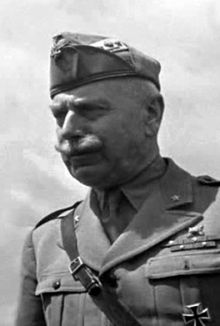Italo Gariboldi
| Italo Gariboldi | |
|---|---|
 |
|
| Born | 20 April 1879 Lodi, Kingdom of Italy |
| Died | 3 February 1970 (aged 90) Rome, Italy |
| Allegiance |
|
| Service/branch |
|
| Rank | General |
| Commands held |
30 Infantry Division Sabauda V Corps Tenth Army Italian Army in Russia |
| Battles/wars | |
| Awards | Knight's Cross of the Iron Cross |
World War I
Second Italo-Abyssinian War
World War II
Italo Gariboldi (20 April 1879 – 3 February 1970) was a senior officer in the Italian Royal Army (Regio Esercito) before and during World War II. He was awarded the Knight's Cross of the Iron Cross by German Führer Adolf Hitler, for his leadership of Italian forces in the Battle of Stalingrad.
Gariboldi was born in Lodi, Lombardy.
From the end of World War I and through the interwar Period, Gariboldi rose in the ranks and held various staff, regimental, and brigade level commands.
In 1935, Gariboldi commanded the 30th Infantry Division "Sabauda" on the northern front during the Second Italo-Abyssinian War. His division was part of the I Corps based in Eritrea. After Italy defeated Ethiopia (Abyssinia) in May 1936, Eritrea, Abyssinia, and Italian Somaliland were joined to form the colony of Italian East Africa on 1 June 1936.
From 1939 to 1941, Gariboldi served as an army commander in Marshal Italo Balbo's "Supreme Command – North Africa". When Italy declared war in June 1940, Gariboldi commanded the Italian Fifth Army stationed on the border with French Tunisia. He ultimately commanded both armies located in Libya. After the Battle of France ended, the Fifth Army became a source of men, parts, and supply for the Italian Tenth Army on the border with Egypt.
...
Wikipedia
